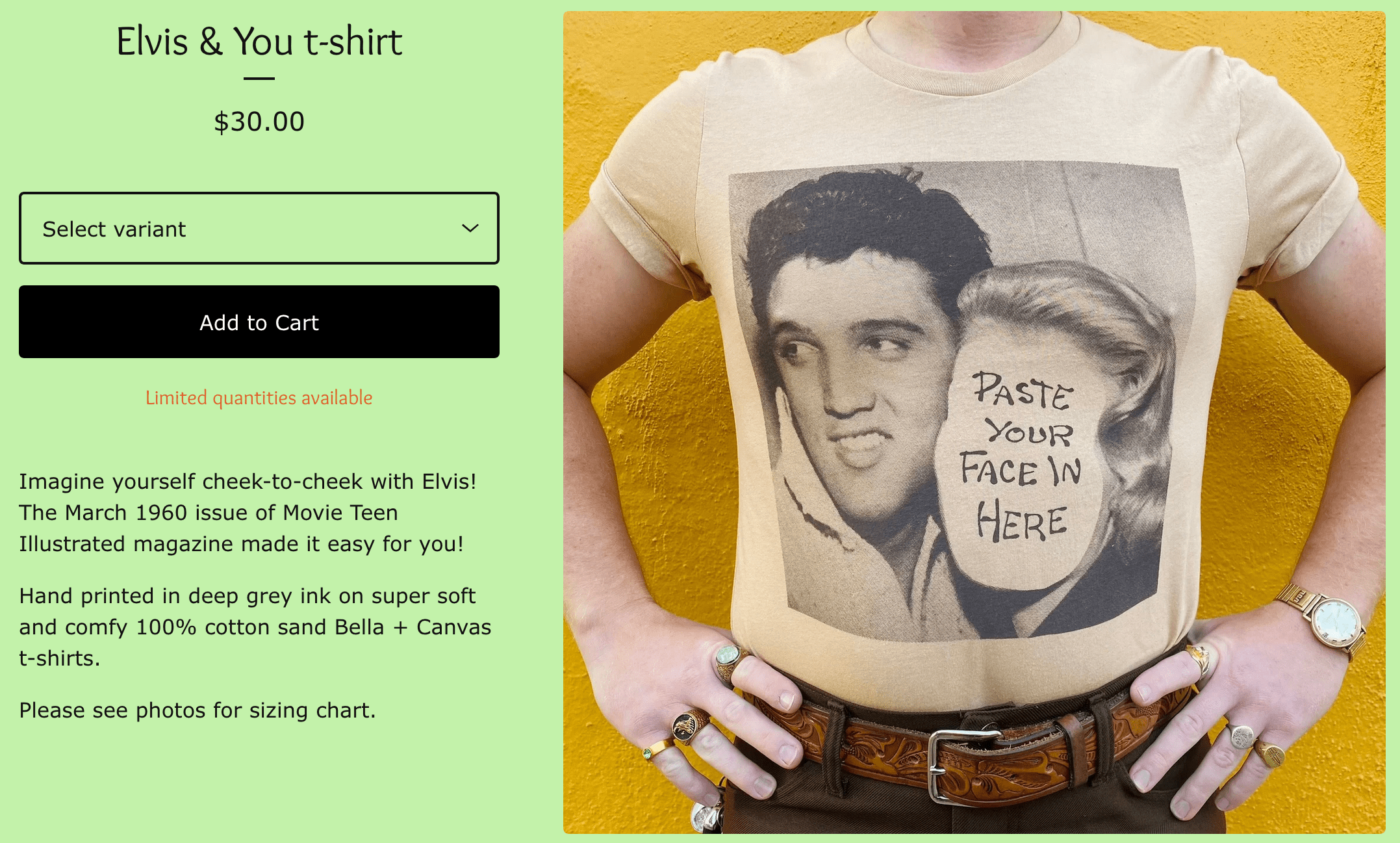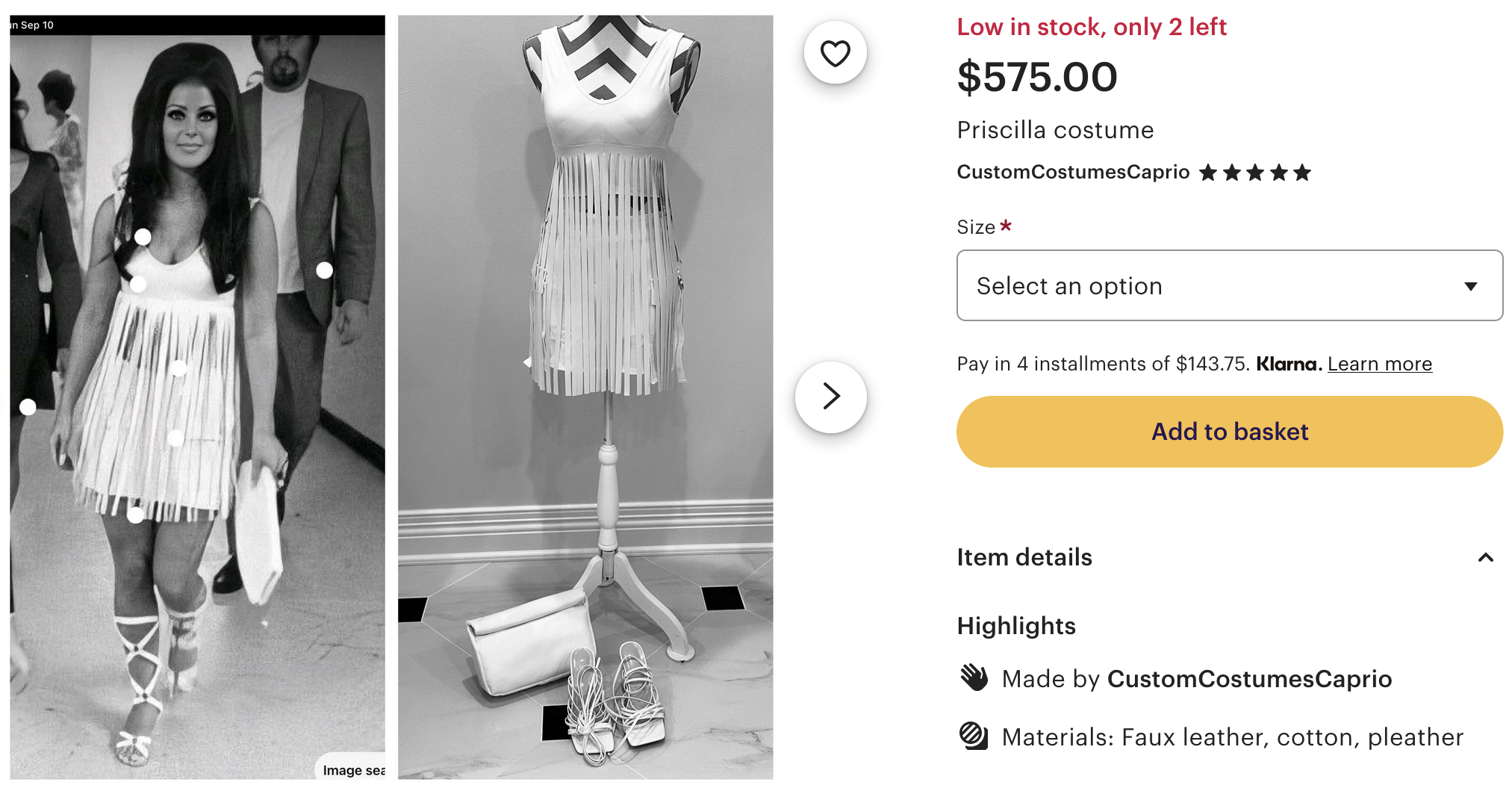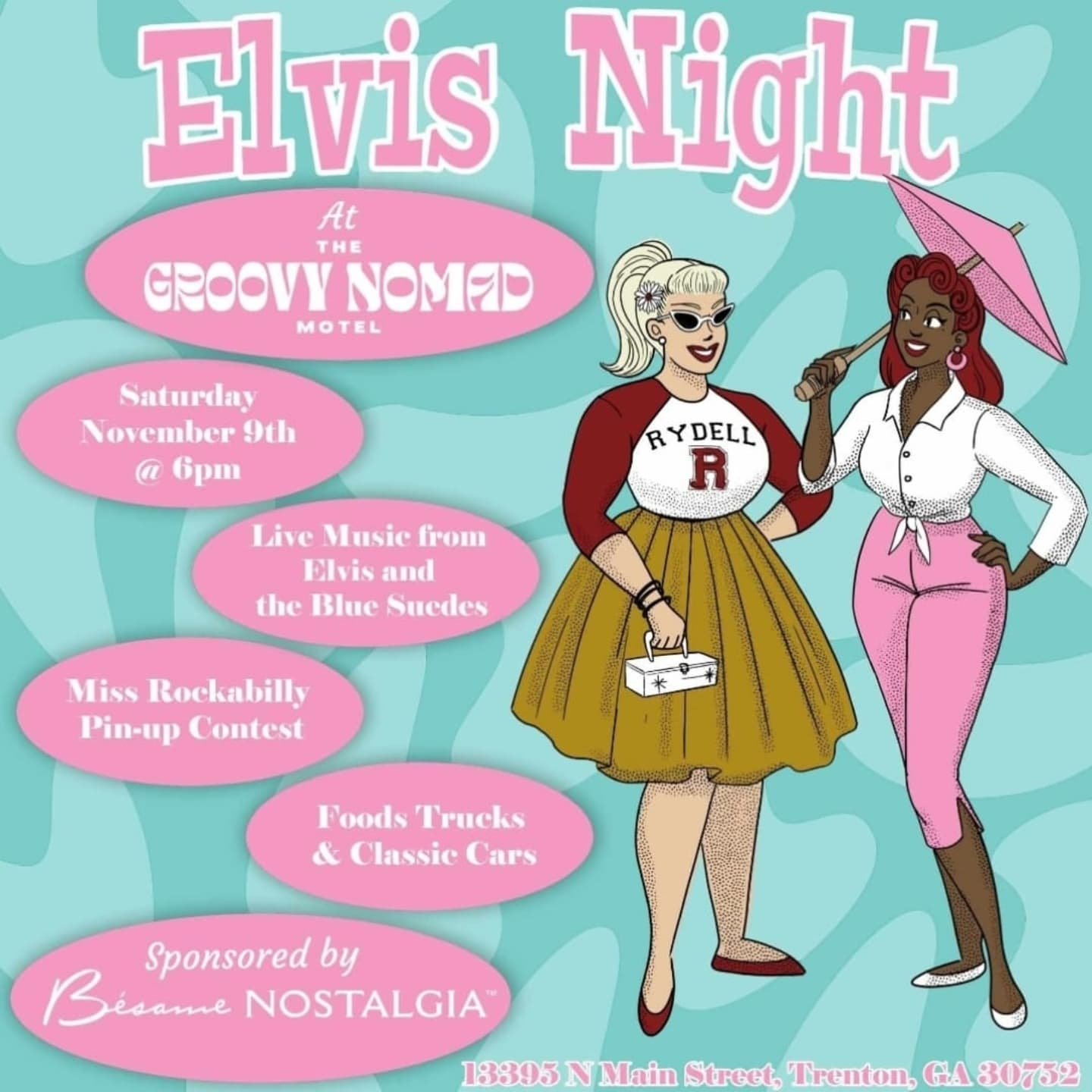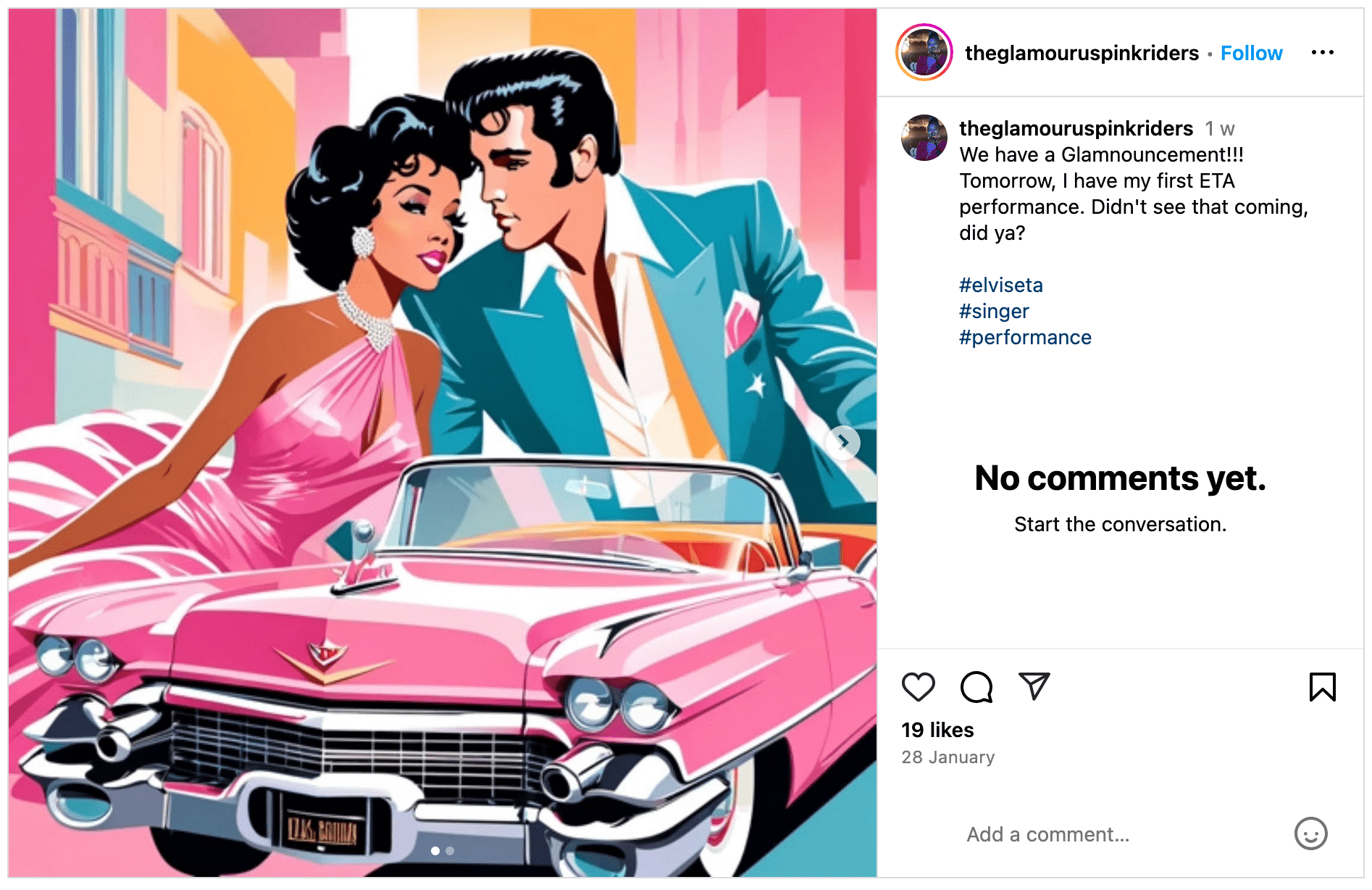Just Pretend: Elvis Girlies, Social Media and Embodied Play
Eleanor Patterson / Auburn University

A recent ad in my social media feed had a silkscreened graphic tee of Elvis Presley being hugged by a female fan with a blank circle over her face that read “Paste Your Face in Here.” Titled “Elvis & You,” this shirt from Taffy Sinclair Prints sells for $30 and offers you the opportunity to play with the parasocial fantasy of being with Elvis and advertise this through your outfit (Figure 1). Possibly to signify an ironic knowingness or participation in community, or both.
Public displays of Elvis fangirl fantasies are nothing new; hysterical girls have been articulated with Elvis’ public persona since this photo was taken in the 1950s.[1 ] What is new in 2025 are the fans and the modes of engagement.
At Graceland last summer, I asked one of the employees if she had noticed a change in the fans since the Baz Luhrman Elvis (2022) came out. Yes, she said, there had been a noticeable increase in younger fans in Graceland’s foot traffic. Then she nodded at two girls in the line ahead of me whose outfits were reminiscent of the psychedelic style of the late 1960s, and added, “And people never used to dress up, that’s new.” I thought of the girls dressed up like Elvis’ ex-wife Priscilla on my tour the day before. The design matched one of her iconic outfits from the 1960s perfectly, and I had suspected they’d purchased Priscilla Halloween costumes similar to the one in Figure 2.

Playing dress-up is only one practice in a host of feminine fannish behavior that this new wave of Elvis fans participates in. On that same trip to Memphis, I stumbled upon the Pink Cadillacs meet-up in the lobby of the Graceland Guesthouse. Pink Cadillacs is a podcast hosted by 20-somethings Victori and Skyllar, who describe themselves as “Elvis Girlies” and invite listeners to “Share your Elvis stories and experiences with us, and let’s create a sisterhood of fans that rock together!” The women at their meet-up ranged, in my estimation, from “is she 18?” to “that could be my 75-year-old mother,” though most participants were probably in their 20s and 30s. Many of them wore retro outfits and make-up as they exchanged Elvis-themed friendship bracelets, stickers, bookmarks, and photo cards with each other and introduced themselves by their Elvis fan Instagram handles.
Figure 3: Pink Cadillacs Meet Up on August 14, 2024 at the Graceland Guesthouse in Memphis
Curious to learn more, I have now dove head-on into Elvis Instagram and learned that The Pink Cadillacs are part of a burgeoning community of female social media creators for whom the Luhrman movie was an entry point into Elvis fandom. This roster of new Elvis fangirl content creators includes the podcasts Those Elvis Girls, The Chronicles of The King, The Jumpsuit Gems, and The Glamourus Pink Riders. These fans not only release podcasts but also share short reels, edits, fan art, and more, while also organizing in-person Elvis fan events such as the official festivals, like Elvis Week in Memphis, and smaller unofficial events, such as the Elvis Night at the Groovy Nomad retro motel in Trenton, GA advertised in the flyer in Figure 4.

Yes, these fans are active in every Jenkinsian textual poaching sense, all the fannish productivities. However, I am more interested in trying to make sense of what Nicolle Lamerichs calls productive fandom, that is, the productive nature of embodied play, and what this new wave of Elvis Girlies can teach us about the material act of playing around with history.[2 ] Play is a key practice of young, new Elvis fangirls, and it encompasses in-person costume play at events or Elvis landmarks, as well as in digital platforms through fan art, photography, reels, ask games. Here are a few examples:

Figure 6: Pink Cadillac hosts Victori and Skyllar dress up and go hang out in the ballroom of the Peabody Hotel in Memphis where Elvis’ prom was held in 1953, lamenting that they are too late with the caption “POV: your bestie and you show up to where Elvis had prom only to realize your [sic] 72 years too late”
Looking at women playing dress up, fantasizing about dating Elvis, and referring to themselves on social media as unhinged, feral or delusional Elvis girlies, perhaps makes it doubly easy to dismiss female Elvis fans as mindless dopes taken in by the feminine mystique of mid-century style and the savvy necro-branding of Elvis Presley Enterprises (EPE). Though any longtime fans familiar with EPE, the commercial entity that runs Graceland, would be skeptical of this sort of economic determinism or any designation of EPE as savvy. For a glimpse of their incompetence, check out this example from the official Elvis Instagram. Its inaccuracies and lazy hashtags epitomize EPE’s careless and uncoordinated attempts at social media presence.
That Elvis continues to be a source of play for a new generation is a testament to the labor of fans as much or more so than the commercial enterprises that have overseen his official legacy. And I don’t think it is a coincidence that Elvis resonates with a new generation of female fans. Our current economy is distinguished by burnout, a gig economy, and hook-up culture. With uncertain prospects for fulfilling professions and relationships, midcentury play, like all other fantasies, offers a respite through the foreign country that is nostalgia for a time never experienced. And, at its heart, this play is not really about Elvis. Or at least, it is about Elvis as much as playing the Dream Date board game with your friends was about going to prom. Which is to say, not at all. What board games like Dream Date, Mystery Date, or Heartthrob offered players was the opportunity to bring up taboo topics like sex and dating within the safe community of trusted peers.
This topic is new for me, and this conclusion is somewhat rudimentary, but I contend that Elvis Presley is significant here only so far as he is the conduit that facilitates this play with history, cultural memory, art, music, and sexuality. Elvis has long been made sense of through his adoring audience. Here, through performance and acts of play, Elvis fangirls reclaim the figure of the rabid fan intentionally. By using terms like “unhinged” and “delusional,” these fangirls reveal and play with the subjectivity of female desire based in affect, the sensation of being crazy or out of control. It is a form of self-presentation that both acknowledges and turns on its head the figure of the hysterical, dangerous female fan at the heart of the moral panic that would come to define Elvis in the 1950s. In contemporary digitally-mediated Elvis fan girl community, sexual desire as play is an expression of affect and a form of communication that engenders connection with other women. One example is Figure 7 by January Presley, another popular Instagram account with over 20K followers. This edit is an artistic bricolage with the perspective used to position Elvis as the object of sexual pleasure placed between the legs of a feminine subject inviting us to gaze upon him as if he is about to perform cunnilingus. But the imagery is also so over-the-top as to elicit humor, response and reciprocity from other members of the online Elvis fandom. January Presley’s festive animated reel offering viewers the opportunity to play with the idea of Elvis Presley performing oral sex, accompanied by the cheeky caption, “If this gets me shut down, it’s worth it,” suggesting that the goal may be communal appreciation and notoriety as much as female pleasure.
Figure 7: “If this gets me shut down, it’s worth it”
This is not to say Elvis girlies are resistance fighters against the male gaze. This new generation of Elvis girls are neither passive dopes nor culture jammers. Those labels miss the point. It is impossible to generalize or designate an amorphous fannish community so wholeheartedly. Rather, we need a framework that accounts for nostalgic play and communal practices while considering affective function, nuance, and ambivalence. Especially for fandoms whose object falls outside fictional diegesis, such as Elvis Presley. Little has actually been written about the labor or the material practices of female Elvis fans, historically or contemporarily. Maybe I am wrong, and if so, please come at me in the comments, I am new here and I am learning. However, my impression is that most of the work on Elvis falls into two categories: histories of the production and circulation of Elvis films, music, and television specials; and histories of the discursive construction of Elvis or his fans through analysis of popular media and press. And, while those topics are certainly relevant, I think it is also worth considering the often invisible and dismissed work and experiences of the women who have been the primary target for Elvis’ media and merchandise consumption, and the scapegoat for much of his controversies and those of our culture more broadly.
Image Credits:
- “Elvis & You” T-shirt from Taffy Sinclair Prints (author’s screenshot)
- A Priscilla Presley costume on Etsy (author’s screenshot)
- Pink Cadillacs Meet Up on August 14, 2024 at the Graceland Guesthouse in Memphis
- Elvis Night at the Groovy Nomad
- CeCe Glamour’s art rendering of herself on a date with Elvis (author’s screenshot)
- Pink Cadillac hosts Victori and Skyllar dress up and go hang out in the ballroom of the Peabody Hotel in Memphis where Elvis’ prom was held in 1953, lamenting that they are too late with the caption “POV: your bestie and you show up to where Elvis had prom only to realize your [sic] 72 years too late”
- “If this gets me shut down, it’s worth it”